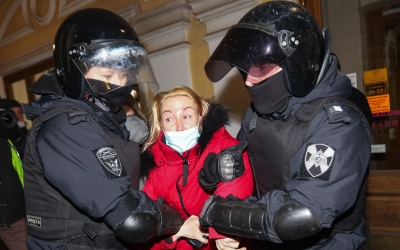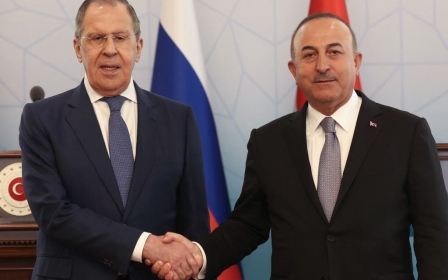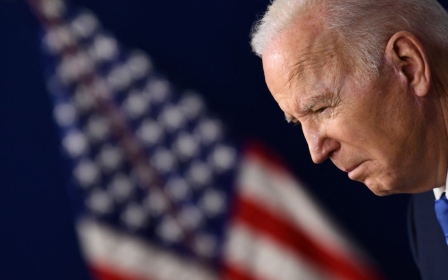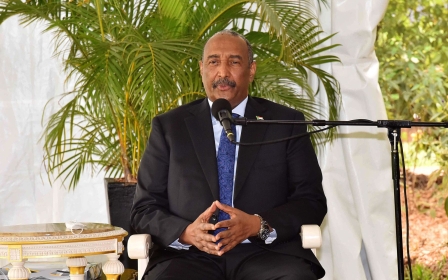Who is Brahim Saadoun? The Moroccan facing the death penalty in Donbas
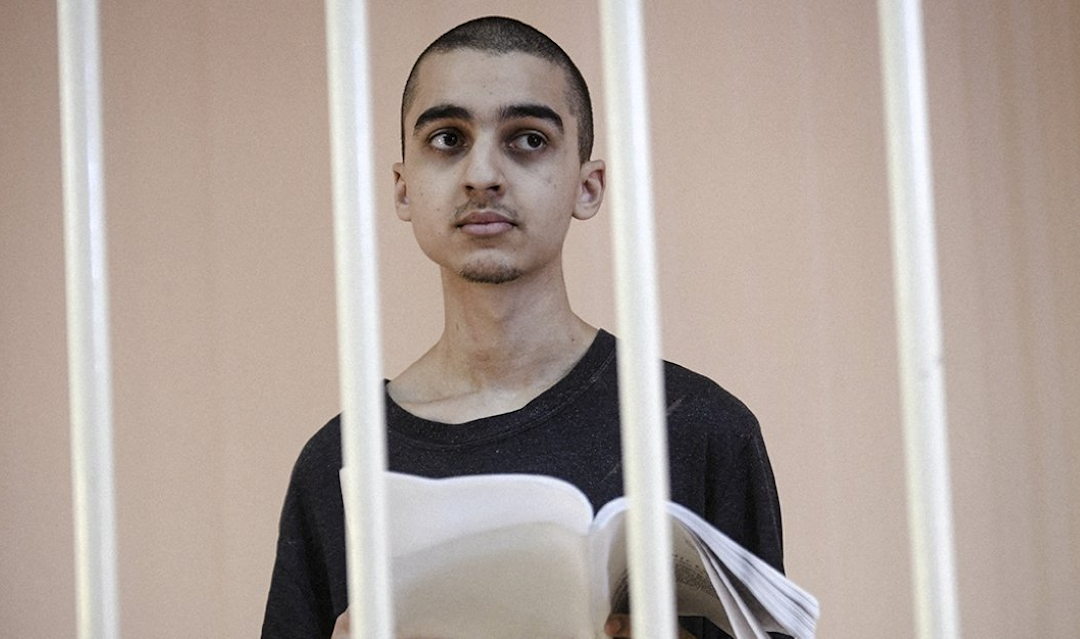
Looking drawn and with empty eyes, Brahim Saadoun faced the Russia Today (RT) cameras: “Hi Dad, Mum. I’m fine here, don’t worry about me. Everything will be fine.”
It was 10 June. The previous day, the 21-year-old Moroccan had been sentenced to death by the supreme court of the People’s Republic of Donetsk (DPR), a separatist pro-Russian region in Ukraine, alongside two British citizens.
The men were found guilty of "mercenary activities and committing actions aimed at seizing power and overthrowing the constitutional order of the DPR," an Interfax news agency quoted a court official as saying.
During the short broadcast by the Arab-speaking news channel of RT, Saadoun made no comment on the sentence. He did however answer the journalist’s questions on his treatment.
“Today, they’ve treated me better than yesterday. I was ready for anything when I gave myself up. But I wanted to live," he answered.
New MEE newsletter: Jerusalem Dispatch
Sign up to get the latest insights and analysis on Israel-Palestine, alongside Turkey Unpacked and other MEE newsletters
A recruit to the Ukrainian army, he confirmed he received a monthly salary of “10,500 to 11,000 hryvnias ($371)", which tripled when he was on the front line.
Contrary to reports appearing across the media, Saadoun was not captured by the Russian army, those close to him told Middle East Eye.
He surrendered during a battle in the Donbas region, in April, while he was wearing the uniform of the Mariupol 36th Marine Brigade, they said.
British citizens Aiden Aslin and Shaun Pinner, and Moroccan national Saadoun Brahim, all of whom fought on contract with Ukraine’s military, have been sentenced to death by the Kremlin’s puppet authorities in Donetsk in show trial that lasted mere days. They were not mercenaries. pic.twitter.com/QYGOEkHXHE
— Christopher Miller (@ChristopherJM) June 9, 2022
How did this young Moroccan end up here? Saadoun was one of 8,000 students from Morocco studying in Ukraine, the second largest foreign student community in the country.
He had been studying at the Kiev Faculty of Aerodynamic and Space Technology for two years.
"But in Autumn 2021, well before war broke out, he left to join the Ukrainian army," Liliia Alieksanova, who met him in the summer of that year at a rave in the capital, told MEE.
This 19-year-old Ukrainian woman, now living in Boston, draws a picture of a man of "extraordinary" empathy, who was "loved for the ease with which he connected with everyone he met".
Saadoun "fell in love with Ukraine, with the rave scene, and he often spoke about how he would like to give something back to the country that had given him so much," Alieksanova said.
According to Alieksanova, Saadoun saw in the army "a sort of catharsis", which enabled him to purge all his demons, specifically the things that were troubling his mind.
“We had long discussions about his mental health. He knew I struggled with anxiety, he helped me enormously to overcome my difficulties," said Alieksanova, who objects to anyone calling her friend a "mercenary".
“He didn’t join the army for the money, nor for a passport. He did it out of personal conviction, well before the Russian invasion,” she says.
“We stayed in contact after I left for the US. But he suddenly stopped replying to my messages in March. The first time I saw his face on a video filmed by a Russian propagandist influencer, I was shocked, because I didn’t recognise the Brahim I knew. Ultimately, I was just happy to know that he was alive."
'Prisoner of war'
Now, Saadoun's Ukrainian friends say they have organised a social media campaign, using the hashtag #SaveBrahim, to defend him by telling the truth about his experience.
In Kyiv, posters bearing his face have appeared in public places as part of the campaign.
“The world needs to know that he’s not a mercenary, that he shouldn’t be treated like one. He’s a prisoner of war,” said Alieksanova.
Saadoun's Ukrainian friends also dispute claims by Saadoun's father that his son had a Ukrainian passport.
“That’s incorrect. Brahim had a residency permit in Ukraine valid through to 2024," they said. "We have copies of all his official documents. His father hasn’t had any contact with him for a long time. He has confused the terms in translation and said he had a passport, but that’s absolutely not the case.”
Brahim was a figure on the underground nightclub scene and had many friends in the city before signing up to join the Ukrainian marines in November 2021. Those friends are deeply concerned about his fate and have launched the social media campaign #SaveBrahim pic.twitter.com/vkXfgV5oyG
— Catherine Norris Trent (@cntrentF24) June 12, 2022
The task for Saadoun's Ukrainian friends is not an easy one.
On 15 June, the chairman of the Duma, the lower chamber of the Russian federal parliament, Vyacheslav Volodin, declared: “The death penalty is the punishment these fascists deserve.”
He may not have been directly referring to Saadoun, but his words came less than a week after the sentences were passed on the Moroccan and his two British companions.
Volodin said it would be “fair" to impose the death penalty in the separatist republic of Donetsk, "particularly in times of war".
Contrary to this view, the UN High Commissioner for Human Rights had stated a few days previously that the trial of the three foreign soldiers constituted "war crimes".
In an emergency hearing on 16 June, the day after Volodin's remarks, the European Court of Human Rights (ECHR) asked Moscow not to execute Saadoun.
Although in mid-March Moscow was excluded from the Council of Europe, the ECHR is clear that Russia is still bound to comply with its decisions.
Morocco apathy
In Morocco, while the affair has been followed by local media, it has not been enough to compel the government to assist Saadoun.
Mainly silent, the Moroccan embassy in Kyiv has limited itself to publishing a press release stating that Saadoun “had been captured wearing the uniform of the Ukrainian army, as a member of a unit of the Ukrainian marines”, and that he "was currently imprisoned by an entity recognised by neither the UN nor Morocco".
The embassy added no further comment.
Amina Bouayach, president of Morocco's National Human Rights Council, confirmed she had written to her Russian counterpart requesting them to "intervene as far as possible to preserve the rights of the Moroccan citizen Brahim Saadoun”.
She added that she had also asked the Russian Human Rights forum to "do its best to ensure Brahim Saadoun benefitted from a fair trial and appeal”.
- This article is a translation of a story originally published on Middle East Eye's French website.
Middle East Eye delivers independent and unrivalled coverage and analysis of the Middle East, North Africa and beyond. To learn more about republishing this content and the associated fees, please fill out this form. More about MEE can be found here.


